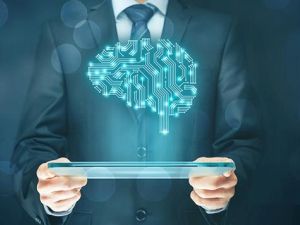Source – cxotoday.com
The advent of artificial intelligence (AI) is taking the world by storm. It has made possible what was usually restricted to the domain of scientific fiction. According to the research company Markets and Markets report “Artificial Intelligence Market by Technology,” it is expected that the AI market would be worth USD 16.06 billion by 2022, growing at a stupendous CAGR of 62.9% from 2016 to 2022. It is affecting all industries and has the potential to impact human lives. Similarly, it is impacting the world of enterprise technology in myriad ways. The world is digitizing at a fast pace and digital transformation technologies are surging ahead. “The more we digitalize, the more our prosperity is secured,” says Wolfgang Wahlster, who leads the German Research Center for Artificial Intelligence (DFKI).
In the twenty-first century, the scope of AI tools is growing much beyond domestic smartphone use. It is impacting all industries and affecting the enterprise resource planning technology (ERP) sector in unimaginable ways. Due to the powerful capabilities, AI technologies are already optimizing system-operating models as well as transforming business processes for enterprises and organizations globally.
A scientist with Google Research, who is also the author of an AI research paper called “Concrete Problems in AI Safety,” says, “The authors believe AI technologies are likely to be overwhelmingly beneficial for humanity but we also believe it is worth giving serious thought to potential challenges and risks,” adding: ‘We strongly support work on privacy, security, fairness, economics and policy.”
AI tools revolutionizing ERP software systems
AI is revolutionizing the ERP software domain and radically transforming the way businesses function. Together with the data mining capability of advanced self-learning enabled AI systems, automation of ERP software systems could bring great value addition to a business. The AI-enabled ERP software can influence the core of an organization’s day-to-day business function and processes by cutting down on operating expenses, streamlining tasks that are routine and removing human errors.
“AI tools can also be customized so that they can learn processes needed for improved competencies to enhance the effectiveness of overall business processes. Advanced ERP technology is helping organizations discover colossal amounts of structured data. With every passing day, they are getting smarter at learning new patterns and quicker at converting the data deluge into insights,” said Shashank Dixit, CEO, Deskera.
Workforce expertise and skill can be optimized through AI tools, increasing the overall effectiveness as the focus shifts in favor of non-routine, analytical, logical, and creative tasks. There is another positive aspect to it as well: AI can liberate workers from manual and monotonous interactions with the ERP software by triggering an evolution of self-driving and semi-intelligent business solutions. AI tools can also be used for ERP software maintenance.
AI-enabled ERPs employ a digital assistant (DA) in order to help technicians perform the root cause analysis for maintenance issues. The provisions can record information and details of performance, maintenance history of a device, and technical structure. The DA tool can extract as well as source information from core ERP systems.
AI has a pivotal role to play in the future of ERP software systems
AI tools can mimic functionalities of a human mind, such as behavioral changes as well as learning and can apply emulated tactics to unstructured data in the ERP. Though there may be apprehension in the adoption of AI tools, there are varied and extensive benefits that can be drawn out of it. It will eventually help organizations improve the primary focus of their businesses, which is to serve customers well.
